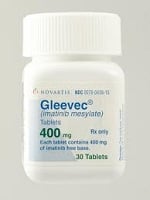Two union funds are suing Novartis ($NVS), claiming that the Swiss drugmaker used "sham" patent-infringement claims to delay a generic version of its blockbuster leukemia drug Gleevec. Though just the latest in a series of legal battles over drug patent settlements, it's the first attempt by purchasers to block one of those settlements, the plaintiffs' lawyers said.
At issue is a May 2014 settlement between Novartis and India-based Sun Pharma, which allowed the generics maker to market its version of Gleevec (imatinib mesylate) beginning Feb. 1, 2016. Though the basic compound patent for Gleevec expires July 4, the two companies had been wrangling over a 2019 patent covering the drug's use.
The purchasers' lawsuit--which seeks class-action status--takes shots at those later patents, claiming that Novartis' attempts to enforce them were "patent gamesmanship and frivolous litigation." The company "listed invalid follow-on patents in the FDA's Orange Book, frivolously sued … Sun for infringing one of those patents" and persuaded Sun to delay its generic launch "in the guise of settling the bogus infringement lawsuit."
Novartis doesn't buy any of these allegations. The patents criticized in the lawsuit "remain legally in force" and "are properly listed" in the Orange Book, and the agreement with Sun "is a lawful settlement" of Sun's patent challenge, spokeswoman Julie Masow said in a statement
"We will vigorously defend our patent rights and litigate these improper allegations," the statement said, adding that the Sun settlement "validates the Novartis patents while allowing Sun Pharma's subsidiary to enter the market with its generic product."
 Patent settlements between branded drugmakers and generics companies have come under fire in recent years. The Federal Trade Commission has been targeting a particular variety, in which branded drugmakers hand over cash, or in some cases, authorized generic rights, to settle a patent challenge. The U.S. Supreme Court ruled in 2013 that such agreements aren't automatically anticompetitive, but that they can be in certain circumstances.
Patent settlements between branded drugmakers and generics companies have come under fire in recent years. The Federal Trade Commission has been targeting a particular variety, in which branded drugmakers hand over cash, or in some cases, authorized generic rights, to settle a patent challenge. The U.S. Supreme Court ruled in 2013 that such agreements aren't automatically anticompetitive, but that they can be in certain circumstances.
In late May, the FTC succeeded in winning a $1.2 billion settlement in a long-running pay-for-delay battle with Teva's ($TEVA) Cephalon unit, which made a deal with generics makers to put off copycat versions of its Provigil wakefulness drug. That record-breaking settlement followed Teva's April agreement to pay $512 million to settle pay-for-delay claims made by wholesalers and direct purchasers of the same med. Under that settlement, Cephalon agreed to buy active pharmaceutical ingredients from the generic challenger, a type of "payment" that the FTC considers anticompetitive.
The evidence in that case was particularly strong, however, so it's not clear how much of a precedent it will set. And in this new case, the union funds' claims against Novartis don't specify any sort of payment changing hands as part of the Sun patent settlement.
Gleevec is an attractive target for the plaintiffs because of its cost: $9,000 per month, according to the lawsuit. It's also one of Novartis' most important brand names, with $4.7 billion in 2013 sales. After the Sun settlement went public, Bernstein analyst Tim Anderson said he expected the generics reprieve to raise Novartis' 2015 earnings per share by about 6%, with no positive effect beyond 2016.
- read the Novartis statement
- get the lawsuit press release
Special Reports: Top 15 pharma companies by 2014 revenue - Novartis | Top 10 patent losses of 2015